Just In
- 2 hrs ago

- 4 hrs ago

- 6 hrs ago

- 17 hrs ago

Don't Miss
- Technology
 Infinix Note 40 Pro 5G Series Goes on Sale in India Today via Flipkart: Check Price, Specs, Offers
Infinix Note 40 Pro 5G Series Goes on Sale in India Today via Flipkart: Check Price, Specs, Offers - News
 Poll Prediction: Will Annamalai Defeat DMK, AIADMK Candidates In Coimbatore? Dinamalar's Survey Is Out
Poll Prediction: Will Annamalai Defeat DMK, AIADMK Candidates In Coimbatore? Dinamalar's Survey Is Out - Automobiles
 Unprecedented Rainfall in Dubai Disrupts Daily Life and Raises Infrastructure Concerns
Unprecedented Rainfall in Dubai Disrupts Daily Life and Raises Infrastructure Concerns - Finance
 Just Dial Hits 52-Week High With 13% Surge On Q4 Results Growth
Just Dial Hits 52-Week High With 13% Surge On Q4 Results Growth - Movies
 Amar Singh Chamkila And Amarjot Kaur's Son REVEALS How The Late Punjabi Singer's First Wife Treats Him
Amar Singh Chamkila And Amarjot Kaur's Son REVEALS How The Late Punjabi Singer's First Wife Treats Him - Sports
 Chamari Athapaththu's unbeaten 195 helps Sri Lanka record highest run-chase in women's ODI cricket
Chamari Athapaththu's unbeaten 195 helps Sri Lanka record highest run-chase in women's ODI cricket - Education
 SCCL Recruitment 2024; Application process, Selection criteria and more
SCCL Recruitment 2024; Application process, Selection criteria and more - Travel
 From Coconut Breaking on Head to Men Dressing as Women: 12 Unique Indian Rituals Explored
From Coconut Breaking on Head to Men Dressing as Women: 12 Unique Indian Rituals Explored
Types Of Solid Foods To Give For Your Baby (8 Months-1.2 Years)
By the time a baby is 6 months old, most mothers stop exclusively feeding their baby with breast milk. From six months of age, the baby is fed mashed foods and soft solid foods. By the time your baby is eight months old, your baby might have graduated to soft solids, cooked vegetables and raw fruits. The first hints of teeth in your baby's mouth can help him to chew his food better. Chewing on fruits like a cold piece of apple can even help soothe his gums that are being subject to teething.
When your baby's diet starts to change from being predominantly milk oriented to being based on external sources of food, you need to be careful that the baby eats the right kind of food. This will make sure that he receives all the nutrition that is required for his rapidly growing body and brain.
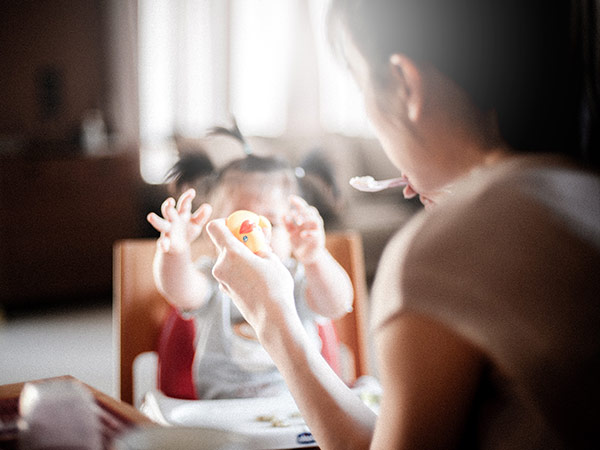
Feeding a baby of 8 months to 1.2 years old can be a big task. The baby might love a particular food a week and the next time, you will see him spit the same food out in disgust. A fussy eater may turn into an eager foodie and a good eater can throw tantrums when it comes to meal times. All these changes will keep you on your toes. It is also certain that you will worry a lot about your child's eating habits and whether he is getting all the nutrition that he requires or not.
Today, we shall discuss about the types of foods that your 8 month to 1.2 year old must be eating. We shall also talk about the various changes that take place during this phase of your baby's life, when it comes to food and mealtimes. Read on to know more.
What changes should you expect in the meals and mealtimes of your baby?
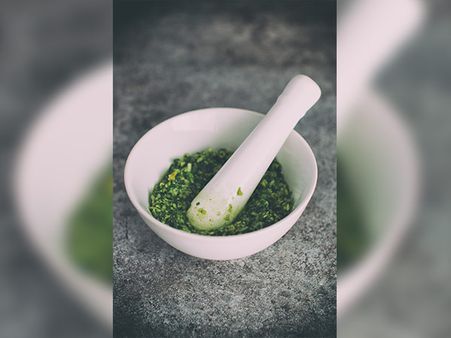
Aversion To Pureed Food
Your baby might not want to eat pureed or mashed food by the time he is 8 months old. He will want to explore more solid foods and might seem more interested in your plate than in his own. He will also want to eat using his hands or might want to try eating tools such as spoon and fork. This can also make feeding pureed and mashed foods hard to feed the baby with.

Your Baby Will Keep You Guessing When It Comes To His Likes & Dislikes
Your baby might love a piece of fruit today but tomorrow, he might behave like the same fruit is the most disgusting thing on the face of the planet. During one meal, he may gulp down everything on his plate and in the next, he may want nothing to do with it. Do not worry. As long as your baby is active and is growing mentally and physically, let your baby choose what to eat and when to eat.

Your Baby May Not Gain A Lot Of Weight When Compared To The First Year
Most babies triple their body weight by the time they are one year old. But the second year is a different story. Most babies put on less than 2.5 kg in the second year. It is normal. You need not worry about your baby being slimmer than you would like him to be. As long as he is healthy and active, you have nothing to worry about.
What are the reasons behind these changes?

The Baby’s Growth
The baby is growing rapidly in the first and the second year of his life. These changes can cause a lot of other changes which include the variations in tastes and the eating habits; however, there is nothing to worry about and it is quite normal.

Your Baby Is Too Busy To Bother About Something So Mundane As Food
Your baby is becoming independent and is moving on his own. He is also becoming aware and increasingly curious about the world around him. He is constantly exploring and learning new things about his surroundings and is learning to interact with it. When his life is so full of excitement, he may not be very interested in things like food and nutrition. He will eat when hungry and will eat only what he requires. It is okay for your baby to do so and you need not force him to eat more.

Should the baby be allowed to feed himself?
Most babies will want to try eating on their own by the time they are one year old. If you baby desires it, you can let him try eating on his own. Be warned, your baby may have more food on the floor than in his mouth. You will have to clean up after him. You baby will also hold his Sippy cup to drink milk or water. Some babies also master the art of drinking from a cup. The learning process might be a little messy, but you will have a lot less work in the future.

What kind of foods should be given to a baby of 8 months to 1.2 years old?
Try giving your baby the food that you normally eat. Just make sure that the food is not too spicy or salty. Go for fresh and unprocessed food, as it will lead to healthy food habits in the future. Keep fatty and sugary foods to a minimum. Cow's milk can be added to the diet if you are planning on weaning your child off of breast milk.
But do not feed him more than 400 ml of milk, as he may become full and not want to eat other solid foods. Curd, paneer, milkshakes, lassi, cream and other milk products can be offered to your child if he doesn't like milk.
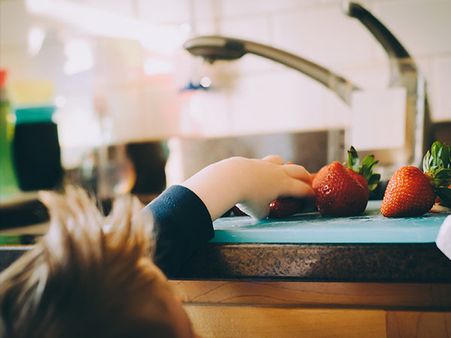
What are the types of foods that an 8 month to 1.2 year old must consume?
A baby of 8 months to 1.2 year old must be given a balanced diet. It must contain carbohydrates, vitamins, proteins and essential minerals. Healthy fats are also an important part of the diet. Fruits and vegetables play a major role in your baby's diet. Also, be sure to include meat (or lentils and pulses for protein if vegetarian), starchy foods and dairy products.
Examples Of Fruits And Vegetables That Are Considered As Superfood For Your Baby:

Lychee
It is sweet and contains a lot of fibre and vitamins.
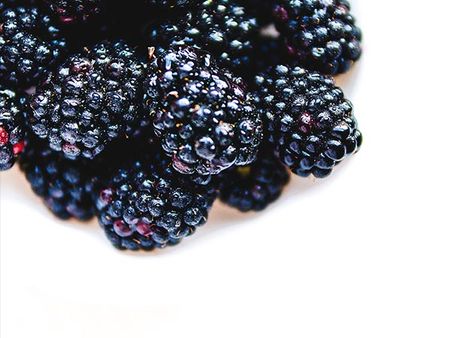
Blackberries
These are a rich source of vitamin E. These protect and help in the growth of heart and the arteries.
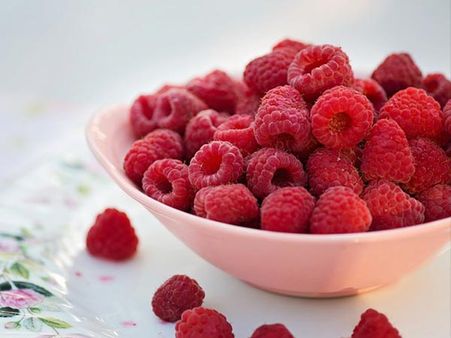
Raspberries
These have ellagic acid. This is proven to give protection against cancer. It has a lot of fibre with the minimum amount of calories.
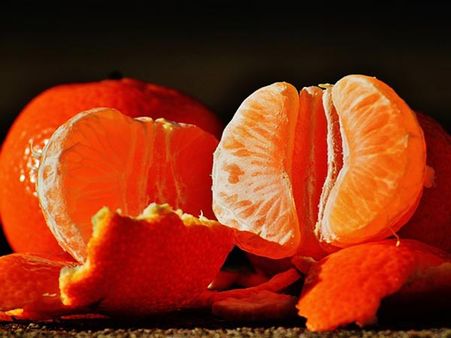
Citrus fruits
These contain vitamin C. Vitamin C is very important in helping the absorption of Iron.
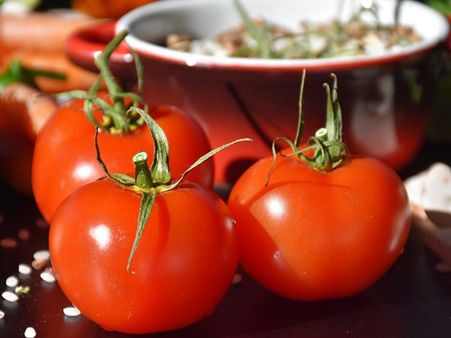
Tomatoes
Tomatoes contain lycopene, which is an antioxidant. Lycopene is considered responsible for the prevention of cancer and diseases of the heart.

Carrots
Carrots are considered to be rich in beta-carotene. It is then transformed into vitamin A, which is considered very important for sight.
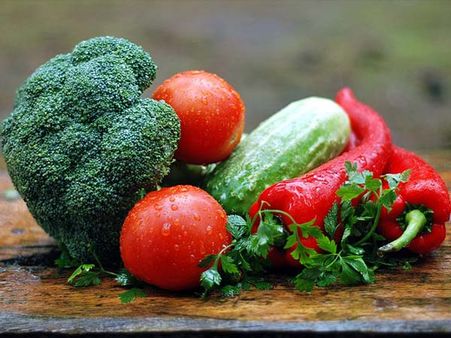
Vegetables with bright colours
Coloured vegetables have phytochemicals that are thought to help in preventing cancer and the diseases of the heart.
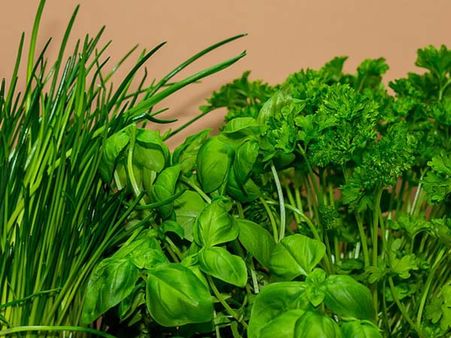
Herbs
The various herbs that are used in cooking not only lends flavour and aroma to the food but also imparts medicinal goodness to it. Parsley, oregano, thyme and other herbs are thought to boost immunity and prevent diseases.
Examples Of Meats Good For Your Baby:

Chicken
Chicken is a healthy meat, as it contains very less amounts of fat. The skin must be removed to gain the most from the meat.
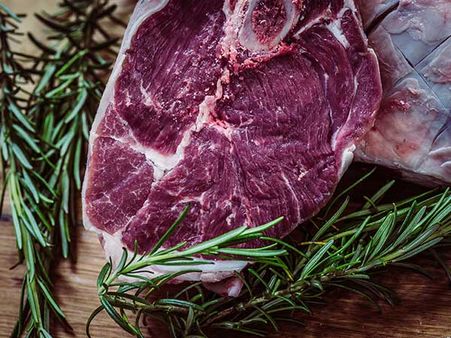
Red meat
Red meat is a source of readily absorbable iron and is important for your baby's health. It also provides your baby's diet with healthy fats.
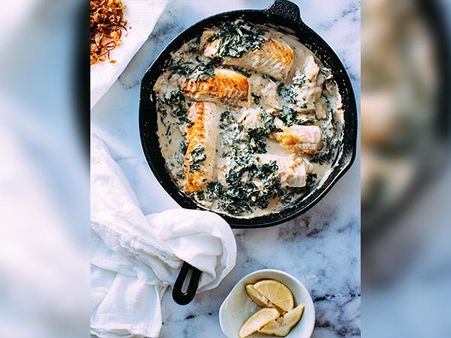
Fish
White fish like cod and haddock provide low-fat source of protein. They also contain minerals like calcium, magnesium and selenium. All these together help in fighting the free radicals in the body and they boost immunity. Fatty fish like salmon helps in supporting a healthy brain function. They also help in boosting the immune system. Children with dyslexia and dyspraxia can benefit from eating such fish.
Examples Of Dairy And Starchy Foods That Are Good For Your Baby
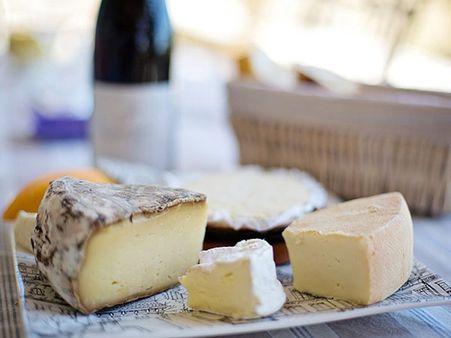
Cheese
Cheese is a great food that gives your baby energy. It also has vitamin B12 and vitamin B2, which are essential for a healthy growth in your baby. It is also a good substitute for meat in vegetarian children.
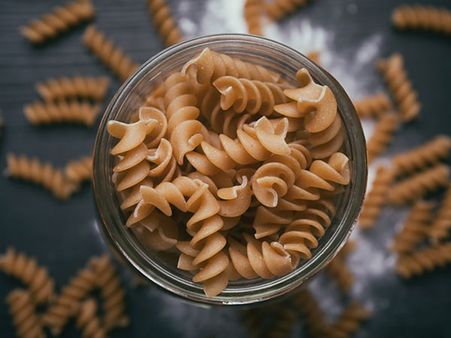
Whole grain pasta
Whole grain pasta gives sustained energy to your baby. This is because it is a source of complex carbohydrates.
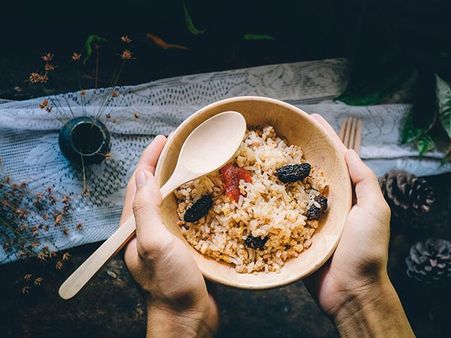
Brown rice
This contains protein, vitamin B and essential minerals. It is also a good source of energy.
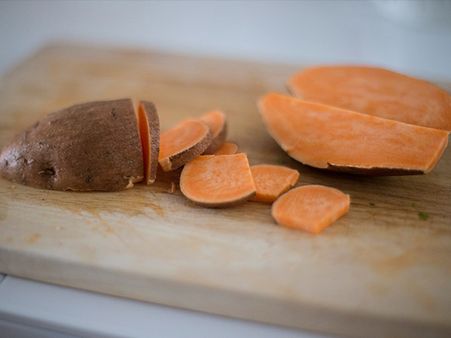
Sweet potatoes
These contain vitamin A and vitamin C. These also have a lot of phytochemicals.
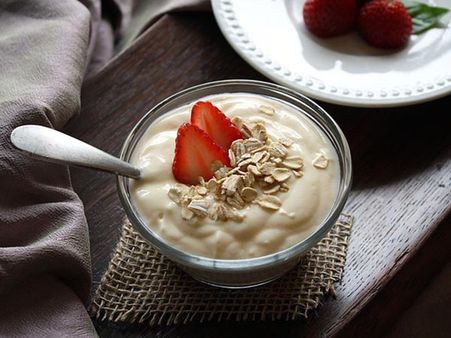
Yoghurt
Yoghurt contains protein, calcium and phosphorus. It is also easier to digest than milk. It is a probiotic food that contains bacteria, which can help improve the health of your baby's intestines.
-
 yoga spiritualityEid Ul Fitr 2024: 50 Modern Muslim Baby Boy Names Born On Eid With Meaning
yoga spiritualityEid Ul Fitr 2024: 50 Modern Muslim Baby Boy Names Born On Eid With Meaning -
 healthIn China, Infant Is Born With Four-Inch Tail Growing from Its Buttocks, Know The Reason Behind This
healthIn China, Infant Is Born With Four-Inch Tail Growing from Its Buttocks, Know The Reason Behind This -
 fashionRaha Kapoor Twins With Mommy Alia Bhatt At Ambani Pre-Wedding Bash, 7 Tips To Match Outfits With Your Baby
fashionRaha Kapoor Twins With Mommy Alia Bhatt At Ambani Pre-Wedding Bash, 7 Tips To Match Outfits With Your Baby -
 beautyFrom Pigtails To Messy Curls, 7 Trendy Hairstyles Generated By AI For Your Little Fashionista
beautyFrom Pigtails To Messy Curls, 7 Trendy Hairstyles Generated By AI For Your Little Fashionista -
 healthExclusive: Doctor Shares How There Is Rise Of Muhurat Deliveries Aligned With Ram Mandir Consecration
healthExclusive: Doctor Shares How There Is Rise Of Muhurat Deliveries Aligned With Ram Mandir Consecration -
 fashionNew Born Baby Photoshoot Ideas Interpreted By AI, 7 Tips To Make This Cute Session Memorable
fashionNew Born Baby Photoshoot Ideas Interpreted By AI, 7 Tips To Make This Cute Session Memorable -
 fashionYear Ender 2023: Baby Clothing Trends That Will Dominate The Little One's Wardrobe In 2024
fashionYear Ender 2023: Baby Clothing Trends That Will Dominate The Little One's Wardrobe In 2024 -
 insync50 Lord Krishna Names For Baby Boy That Will Bless Your Child With Divine Qualities
insync50 Lord Krishna Names For Baby Boy That Will Bless Your Child With Divine Qualities -
 pregnancy parentingTwo Wombs, Four Hearts: US Mom's Extraordinary Double Uterus Pregnancy
pregnancy parentingTwo Wombs, Four Hearts: US Mom's Extraordinary Double Uterus Pregnancy -
 pregnancy parentingDelhi Air Pollution: Pregnant Women Must Follow These 4 Things!
pregnancy parentingDelhi Air Pollution: Pregnant Women Must Follow These 4 Things! -
 home n gardenHappy Birthday Raha Kapoor: From Customized Wall Art To Figurine Hooks, 8 Ideas To Decorate Your Baby's Room
home n gardenHappy Birthday Raha Kapoor: From Customized Wall Art To Figurine Hooks, 8 Ideas To Decorate Your Baby's Room -
 pregnancy parentingExpert Opinion On Breastfeeding: How It Will Help Baby And Mother
pregnancy parentingExpert Opinion On Breastfeeding: How It Will Help Baby And Mother


 Click it and Unblock the Notifications
Click it and Unblock the Notifications



